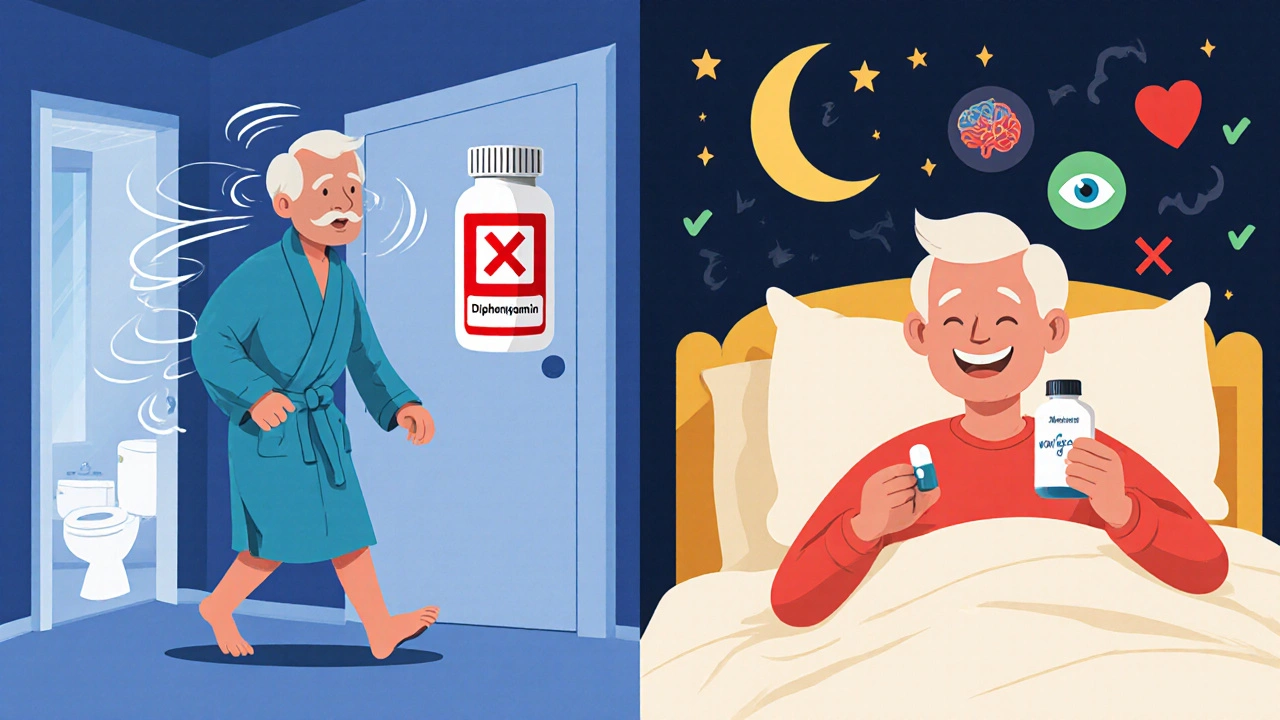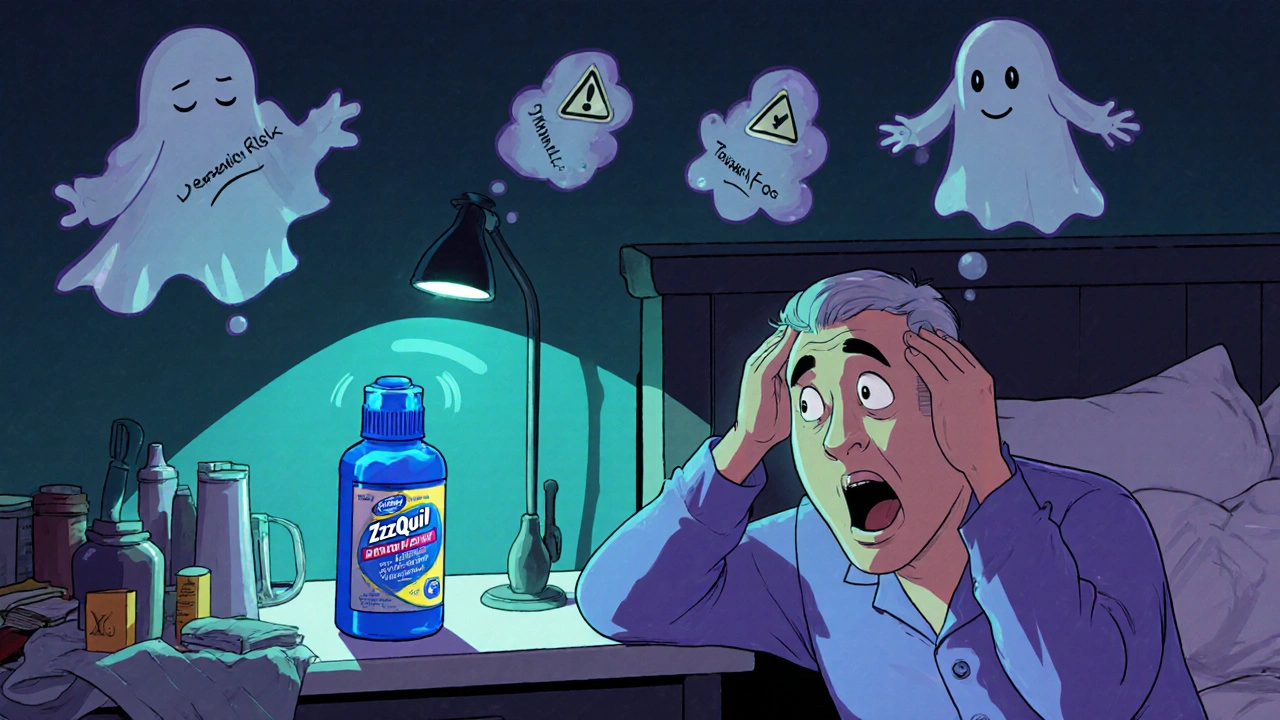Millions of people reach for diphenhydramine every night thinking it’s a quick fix for trouble falling asleep. You’ve probably seen the bright blue bottles of ZzzQuil or the familiar yellow packaging of Unisom SleepGels. It’s cheap, easy to find, and works-fast. But what happens after the first week? Or the third? And why are doctors warning older adults to stay away?
How Diphenhydramine Really Works (And Why It’s Not What You Think)
Diphenhydramine isn’t a sleep drug. It’s an antihistamine, originally designed to treat allergies. When it blocks histamine in your brain, it slows down neural activity. That’s why you feel drowsy. But this isn’t natural sleep. It’s chemical sedation. Your brain doesn’t go through the normal sleep cycles. You skip deep sleep and REM sleep, the parts that actually restore you.
That’s why you wake up feeling foggy. A 2021 study found 68% of people using diphenhydramine for sleep reported next-day brain fog, compared to just 12% in the placebo group. It’s like driving with a blood alcohol level of 0.10%-above the legal limit in every U.S. state. The FAA bans pilots from taking it. The European Medicines Agency says it affects your ability to drive. And yet, it’s still sold next to gum and candy in drugstores.
The Hidden Dangers: More Than Just Drowsiness
Side effects aren’t just annoying-they’re dangerous. Dry mouth? Common. Dizziness? Yes. But here’s what most people don’t know: diphenhydramine is a powerful anticholinergic. That means it blocks acetylcholine, a brain chemical critical for memory, focus, and muscle control.
In older adults, this isn’t just a side effect-it’s a risk multiplier. A 2024 Johns Hopkins study tracked adults over 65 for seven years and found those using anticholinergics like diphenhydramine had a 54% higher risk of developing dementia. That’s not a small bump. That’s a major red flag. The FDA now requires labels to warn about confusion, hallucinations, and nervousness-especially in kids and seniors.
And it’s not just your brain. For men over 65 with prostate issues, diphenhydramine can cause urinary retention. For people with glaucoma, it can spike eye pressure. It can speed up your heart rate. It can trigger seizures in children. The FDA recorded 127 seizure cases linked to diphenhydramine between 2019 and 2023.
Why It Stops Working (And What Happens When You Keep Taking It)
Here’s the cruel trick: diphenhydramine stops working fast. A 2021 University of Michigan study showed that 68% of users lost its sleep-inducing effects after just seven days. That’s tolerance-your brain adapts. So you take more. Or you take it every night. But the FDA says it’s only meant for occasional sleeplessness, not longer than 14 days.
Reality check: a 2022 study found 73% of users kept taking it past two weeks. Over 40% used it for more than 30 days straight. They didn’t realize they were training their brain to need a chemical crutch just to fall asleep. And when they tried to quit? Many reported rebound insomnia worse than before.

Who’s Really Using It? (And Why It’s a Problem for Older Adults)
Here’s the disconnect: 19% of adults over 65 use diphenhydramine for sleep. Only 6% of people under 34 do. Why? Because older adults are more vulnerable to its side effects. Their bodies clear the drug slower. Half-life? Up to 18 hours in seniors versus 4 hours in teens. That means the sedation doesn’t fade-it lingers. One in three seniors using it reported falls or accidents due to next-day drowsiness. Nearly 30% said they had memory problems.
And yet, it’s still marketed as a safe, over-the-counter solution. The American Academy of Sleep Medicine says it’s not recommended for chronic insomnia. Period. They’ve said it since 2017. And in 2024, 27 sleep experts signed a consensus statement: “Avoid recommending diphenhydramine as a first-line sleep aid for patients of any age.”
Safer Alternatives That Actually Work
There are better options. Not all are pills. Not all are drugs.
- Melatonin: A natural hormone your body makes. Doses of 2-5 mg help reset your internal clock. A 2023 meta-analysis found it effective for sleep onset in 62% of users-with almost no next-day grogginess. No tolerance. No dementia risk. No urinary retention.
- Cognitive Behavioral Therapy for Insomnia (CBT-I): This isn’t a pill. It’s a structured program that teaches you how to sleep better without drugs. Studies show 70-80% of people improve. And the benefits last for years. The American Academy of Sleep Medicine calls it the gold standard.
- Good sleep habits: Dim the lights an hour before bed. Avoid screens. Keep your room cool. Get up at the same time every day-even on weekends. These aren’t tricks. They’re biology.
Even if you want something stronger, prescription options like zolpidem (Ambien) are safer under medical supervision. They’re still not ideal for long-term use, but they’re designed for sleep-not allergy relief.
What to Do Right Now
If you’re using diphenhydramine every night:
- Stop. Don’t quit cold turkey-talk to your doctor. Withdrawal can cause temporary insomnia.
- Try melatonin first. Start with 1-2 mg, 30 minutes before bed.
- Track your sleep for a week. Use your phone or a notebook. When do you fall asleep? How do you feel in the morning?
- Ask your doctor about CBT-I. It’s covered by many insurance plans now.
- Remove diphenhydramine from your medicine cabinet. Out of sight, out of mind.
If you’re over 65 and taking it? Stop immediately. Talk to your doctor. There’s no safe long-term use for you.
If you’re under 30 and it works? Great. But don’t assume it’s harmless. You’re not invincible. The brain changes you’re causing now could show up in 20 years.
Why This Matters Beyond Your Sleep
This isn’t just about sleep. It’s about how we treat our bodies. We’ve turned a drug meant for sneezing into a nightly ritual. We’ve normalized chemical sedation over real rest. And we’re paying for it-with memory loss, falls, confusion, and a growing dementia crisis.
The market for OTC sleep aids is still big. Diphenhydramine products made $275 million in 2023. But sales are dropping. More people are choosing melatonin. More are asking for CBT-I. The tide is turning. You don’t have to wait for the science to catch up. You can choose better today.
Is diphenhydramine safe for long-term use as a sleep aid?
No. Diphenhydramine is only approved for short-term, occasional use-no longer than 14 days. Long-term use increases the risk of tolerance, next-day impairment, urinary retention, confusion, and dementia. Studies show a 54% higher dementia risk in adults over 65 who use it regularly. The American Academy of Sleep Medicine and FDA both advise against using it for chronic insomnia.
Why is diphenhydramine still sold if it’s risky?
It’s still sold because it’s classified as GRASE (Generally Recognized As Safe and Effective) by the FDA for temporary sleeplessness. But that doesn’t mean it’s safe for everyone or for long-term use. The FDA requires warning labels, but those aren’t always noticed. It’s cheap, widely available, and marketed as a simple fix. The real issue is that safer alternatives like CBT-I aren’t as easy to sell in a bottle.
Can I take diphenhydramine with other medications?
It’s risky. Diphenhydramine can interact with antidepressants, antipsychotics, opioids, muscle relaxants, and alcohol-increasing drowsiness, confusion, and heart rhythm problems. It can also worsen conditions like glaucoma, prostate issues, and epilepsy. Always check with your doctor or pharmacist before combining it with anything else.
Does melatonin really work better than diphenhydramine?
Yes-for most people. Melatonin helps regulate your sleep-wake cycle, especially if you have trouble falling asleep due to jet lag or irregular schedules. It doesn’t cause next-day grogginess, tolerance, or cognitive decline. Studies show it’s effective for sleep onset in about 62% of users. It’s not a sedative-it’s a signal to your brain that it’s time to sleep.
What’s the best non-drug way to improve sleep?
Cognitive Behavioral Therapy for Insomnia (CBT-I) is the most effective non-drug treatment. It teaches you how to change thoughts and behaviors that keep you awake. Studies show 70-80% of people improve, and the results last for years. Other simple habits help too: consistent wake-up times, avoiding screens before bed, keeping your bedroom cool and dark, and getting sunlight in the morning.
What Comes Next?
If you’ve been using diphenhydramine for months-or years-it’s not too late to change. Start small. Swap one night of diphenhydramine for melatonin. Try a 10-minute wind-down routine. Write down three things you’re grateful for before bed. Track how you feel in the morning.
You don’t need a miracle cure. You need better information. And you deserve rest that doesn’t cost you your memory, your balance, or your future.



Nick Lesieur
lol so now i'm supposed to believe that zzzquil is the devil? bro it's just diphenhydramine. i've been taking it for 10 years and i'm still standing. also my cat sleeps better than you.